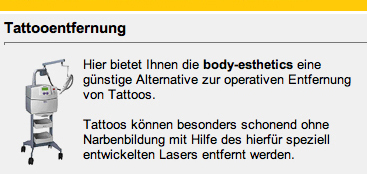|
|
 |
| A teacher who converted to Islam is not permitted to wear a headscarf while teaching in the state of Baden-Württemberg | |
Extended Modifiers in English:
An adjective designates an attribute (big, little, angry, sweet, etc.) that then modifies or describes a noun ("a holy terror," "an honest politician," "a compassionate conservative").

In addition to such "ordinary" forms, English can construct adjectives from present or past participles. In the case of the present participles, the constructed adjective indicates the activity being performed by the noun: "a babbling brook," "a running dog of capitalism," "a weeping willow." As these examples show, the present participle is normally formed by adding -ing to the infinitive. Past participles that are used as adjectives normally indicate an activity that affects the modified noun: "an expressed opinion," "a renovated car," "a forgotten principle." As these examples indicate, a past participle is normally formed by adding -ed (or some variant) to the infinitive form of a weak (regular) verb or an -en (or some variant) to a strong (irregular) verb.
In a limited way, English permits some extension of this modifier (with, or sometimes without, a hyphen), so that we can talk about "a little-known fact," "a long-awaited response," "his yet-to-be-written book," "a soon-to-be-forgotten boyfriend," "a back-stabbing boot-licker," "The English-Speaking Peoples' Union, or " her often-missing husband."
Longer extensions, however, are not standard and at best lead to comical formulations. The basketball-player Darryl (Chocolate Thunder) Dawkins used this to effect when assigning names to his spectacular dunks. After dunking over Bill Robinzine and smashing the glass backboard in the process, he called that action The Chocolate-Thunder-Flying, Glass-Flying, Robinzine-Crying, Babies-Crying, Glass-Still-Flying, Cats-Crying, Rump-Roasting, Bun-Toasting, Thank You-Wham-Bam-I-Am-Jam.
Extended Modifiers in German:
It is possible to create participial adjectives in German, as well.
 A German present participle is formed by adding -d to the infinitive;
for that to become an adjective requires the further addition of
the proper ending.
Here, as in English, the adjective constructed from a present participle indicates the activity being performed by the modified noun:
A German present participle is formed by adding -d to the infinitive;
for that to become an adjective requires the further addition of
the proper ending.
Here, as in English, the adjective constructed from a present participle indicates the activity being performed by the modified noun:
| ein laufender Hund | a running dog | ein weinendes Kind | a crying child |
| lesende Mönche | reading monks |
| Bellende Hunde beißen nicht. | Barking dogs don't bite. | ein wachsendes Problem | a growing problem |
 Constructing German past participles is a little more complicated. To see all the possibilities, consult the page on
the present perfect tense.
These participles also require the addition of
the proper ending
to become an adjective. Here, too, past participles, when they are formed from a transitive verb, indicate an activity that affects the modified noun:
Constructing German past participles is a little more complicated. To see all the possibilities, consult the page on
the present perfect tense.
These participles also require the addition of
the proper ending
to become an adjective. Here, too, past participles, when they are formed from a transitive verb, indicate an activity that affects the modified noun:
| eine geschlossene Gesellschaft | a private (closed) party | ein gebrauchter Wagen | a used car |
| ein ungeschriebenes Blatt | a blank (unwritten) sheet of paper; tabula rasa |
| die zerstörte Stadt | the destroyed city | das verlorene Buch | the lost book | ein unverdienter Tadel | an undeserved rebuke | die erzwungene Emigration | the forced emigration |
|
|
|
|
Berlin Memorial Plaque
In a mansard in this house at the beginning of 1928, the Comedian Harmonists were founded at the initiative of Harry Frommermann, mit Robert Biberti, Erwin Bootz, Erich Collin, Roman Cycowski, and 'Ari' Leschnikoff. The world-famous vocal ensemble was broken up in 1935 by the forced emigration of the three Jewish members. |
|
Certain brief extensions of these modifiers are easily converted to English:
| eine gut gebratene Gans | a well-roasted goose | ein längst vergessenes Buch | a long-forgotten book |
| ein sorgfältig geschriebener Aufsatz | a carefully-written essay |
| ein gut aussehender Mann | a good-looking man | seine schwer bewaffnete Frau | his heavily-armed wife |
But German permits far greater extensions. Take the following phrase:
| der eben jetzt auf Bahnsteig 2 einfahrende Zug |
A literal translation might read: "the just now at Platform 2 arriving train," which is of course not a permitted structure. Rather, we need to turn to a relative clause: "the train that is just now arriving at Platform 2."
Or, to take a clause from Kafka's Das Urteil:
| wie der Freund bei seinen immer seltener werdenden Besuchen klagte |
To translate that phrase, one could finesse the werdende: "as the friend complained during his increasingly infrequent visits". But here, too, a relative clause might be called for: "as the friend complained during his visits, which were becoming increasingly infrequent."
Some further such examples:
|
|
 |
|
Tattoo Removal Here Body Esthetics [name of a firm] offers a convenient alternative to the surgical removal of tattoos. Tattoos can be removed particularly gently, without scarring, with the help of this laser, which was especially developed for the purpose. |
|
| Ein einmal in der Schule auswendig gelerntes Gedicht vergisst man schnell. |
| A poem that was memorized once in school is soon forgotten. |
| Die Ärztin konnte dem alten, schon seit Jahren an Rheumatismus leidenden Mann endlich helfen. |
| The doctor was able to help the old man who had already been suffering from rheumatism for years. |
| "die sorgsam auf der kleinen Nussbaumkommode ausgebreiteten Gegenstände" [from Gerhart Hauptmann's Bahnwärter Thiel] |
| the objects that were carefully spread out on the small walnut chest of drawers |
| "Ein von Natur oder durch Geistesknechtschaft, gelehrten Luxus und Eitelkeit erschlaffter und gekrümmter Charakter wird sich nie zum Idealismus erheben." [quotation from Fichte] |
| A character that has grown flaccid and bent from nature or through intellectual servitude, learned luxury and vanity will never raise itself to idealism. |
| "Eine Lehrerin verstößt gegen die durch das Schulgesetz auferlegte Dienstpflicht, wenn sie in der Schule aus erkennbar religiösen Gründen eine Kopfbedeckung trägt."1 |
| A teacher violates her official obligations that have been imposed by the laws on education when she wears a headscarf for recognizably religious reasons. |
| "Die am späten Abend nach Schließung der Wahllokale im polnischen Nachrichtensender TVN 24 veröffentlichten Prognosen" 2 |
| The forecast that was announced on the Polish news station TVN 24 late in the evening after the closing of the polling stations |
| "Von der Trägheit der Materie, dieser dem Tanze entgegenstrebendsten aller Eigenschaften, wissen sie nichts." [from Kleist's Über das Marionettentheater] |
| Of matter's inertia, this quality that more than any other works against the dance, they know nothing. |
Note again that an extended adjective that has been formed from a present participle tends to lead to a relative clause in the active voice:
| in den Arterien langsam fließendes Blut | blood (that is) slowly flowing in the arteries |
Or, to take another example from Kafka's Das Urteil
| "Er hatte gerade einen Brief an einen sich im Ausland befindenden Jugendfreund beendet." |
| He had just finished a letter to a friend from his youth who was living abroad. |
On the other hand, past participles, at least those that have been constructed from transitive verbs, tend to elicit passive constructions:
|
|
.jpg) |
| In the house next door, Am Kupfergraben 4a, which was destroyed in WWII, Georg Wilhelm Friedrich Hegel lived from 1818-1831. The main representative of German Idealism from 1818 Professor of Philosophy at the University of Berlin. | |
| die im Krieg zerstörte Kirche | the church that was destroyed in the war |
Past participles that have been constructed from intransitive verbs, however, tend to indicate an activity that has previously been performed by the modified noun:
|
|
 |
|
"Are you just stupid?!"
Answer-Library: The largest collection to be found on the internet of frequently-heard attacks and the snappiest answers to them. |
|
But of course the passive voice can be implied by a present-participial adjective preceded by zu:
| die im Internet zu findende Sammlung | the collection that is to be found in the internet |
| Dieses nicht leicht zu lösende Problem können wir heute nicht besprechen. | Today we cannot discuss this problem, which is not easily resolved. |
| Dieses allerdings gehörte schon zu den vom Hungern überhaupt nicht zu trennenden Verdächtigungen [from Kafka's Ein Hungerkünstler]. | This belonged, however, to the suspicions that were not to be separated from the profession of fasting. |
"Ordinary" adjectives, not just participial ones, can also be the basis of extended modifiers, as with wichtig in the following example:
| Die später für die Atomforschung so wichtige Entdeckung blieb zuerst unbeachtet. |
| This discovery, which would later be so important for atomic research, remained at first unnoticed. |
Or a different example, using erkennbar:
|
|
 |
|
Obstacles that are discernible too late; Drivers are not liable in an accident.
Drivers are not liable when obstacles on the autobahn are discernible too late. Someone, for example, who fails to see a tire lying on the autobahn in the dark until it is too late and causes an accident, does not have to pay damages. |
|
1 From a decision of the Upper Administrative Court in Stuttgart (see the illustration at the top of this page).
back to text
2 This example, taken from Der Spiegel,
was posted by Mark Liberman, along with the translation that follows.
back to text
